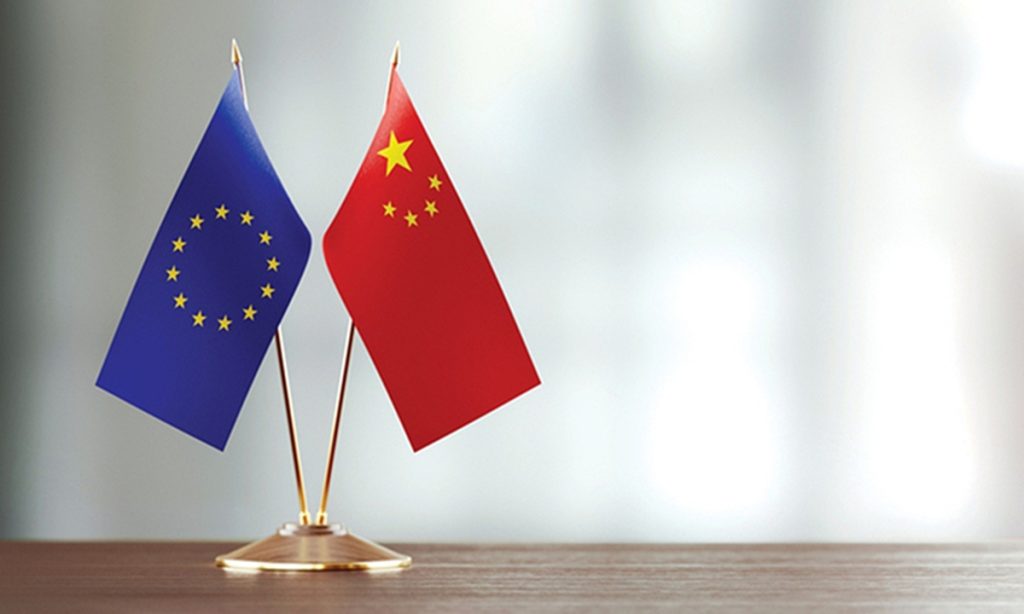High-level reception to Chinese FM underscores importance Europe attaches to bilateral ties: expert

Chinese experts said the high-level reception of Chinese Foreign Minister Wang Yi from European countries' leaders highlighted Europe's emphasis on China ties amid complicated international relations. Moreover, Wang's visit to Europe comes at a crucial time that will help to transform Europe's perception of China's development. Trade frictions between the two sides have underscored the complexity of their relationship, the experts said, adding that the choice to address such disputes through dialogue reflects maturity in their engagement.
From June 30 to July 6, Wang visited the EU Headquarters, Germany and France. During the visit, Wang met with French President Emmanuel Macron, German Chancellor Friedrich Merz, Belgian Prime Minister Bart De Wever and held a high-level dialogue with various European officials.
Macron met with Wang on Friday, pledging to jointly promote multilateralism and strengthen coordination against hegemonic conflicts and bloc confrontation, according to Xinhua.
Macron said France and China share a broad consensus on numerous important issues, including advocating multilateralism and adhering to international laws. France and China, both permanent members of the United Nations Security Council, bear even greater responsibilities as today's world is facing growing uncertainty and unpredictability.
Wang said China is willing to strengthen strategic communication and united cooperation with France, jointly practice multilateralism, oppose unilateral bullying, and resist bloc confrontations, so as to inject more certainty and predictability into a world of change and turmoil, promote equal and orderly multi-polarization and universally beneficial and inclusive economic globalization, and work together to build a community with a shared future for mankind.
During his visit, Wang also met with Merz and De Wever respectively. He also held the 13th round of China-EU High-level Strategic Dialogue, and the eighth round of China-Germany Strategic Dialogue on Diplomacy and Security.
Wang was received by state leaders and senior officials from major European countries and the EU, and held talks that spanned a vast range of topics across multiple fields. These in-depth, comprehensive discussions between China and Europe - coming at a critical juncture - have helped align their positions and facilitate the exchange of views, a development of great significance for China-EU relations, Jiang Feng, professor of European Studies at Shanghai International Studies University and president of the Shanghai Association of Regional and Country Studies, told the Global Times.
Amid the global turmoil, where Europe is mired in security anxiety, suspicion toward allies, and concerns of its future, Wang's visit will help to transform Europe's perception of China from a threat to opportunity; such transformation will also push bilateral ties to step forward from strategic adjustment to a period of maturity and stability, said Jiang.
Complicated relations
China's Ministry of Finance (MOF) and the Ministry of Commerce (MOFCOM) released statements on Sunday on restrictive measures concerning medical device imports from the EU in government procurement activities. This came after the EU introduced measures that restrict Chinese companies and products from participating in its public procurement of medical devices in June.
"The measure we have taken this time is a reciprocal response to relevant actions by the EU. Hopefully it will encourage the EU to foster a fair and reasonable environment for Chinese enterprises and products," Zhou Mi, a senior researcher at the Chinese Academy of International Trade and Economic Cooperation, told the Global Times on Sunday.
Zhou further explained that the move was not an attempt to restrict EU companies, but rather a reminder to the EU side not to impose discriminatory restrictions based on subjective assessments.
French Finance Minister Eric Lombard claimed Europe must strengthen its tariff barriers to counter Chinese imports that risk harming the continent's industrial economy, Bloomberg reported on July 5.
Lombard said China's industrial policies, which he claimed aim to dominate global market, could "kill" European industries. Therefore, he called for "wider use of measures against imports from China," according to the Bloomberg report.
"However, such measures will violate the WTO's non-discrimination principle and also breach the principles of fair and open trade," Cui Hongjian, director and professor of the Center for European Union and Regional Development Studies at Beijing Foreign Studies University told the Global Times.
Cui said that despite unfriendly rhetoric from several French politicians, China will maintain a stable and pragmatic policy toward France.
Cui highlighted the importance of strategic communication and dialogue in maintaining China-France relations.
During his meeting with Macron, Wang also said China is willing to deepen mutually beneficial cooperation with France and hopes that the French side will provide a more favorable and fair environment for Chinese enterprises to invest and operate in France, he said.
Cui emphasized that China remains committed to fair trade and mutual benefit.
China announced anti-dumping duties on European brandy on July 4 while exempting major cognac makers that agreed to minimum price levels. Following a legal review, it accepted price undertakings submitted by relevant EU industry associations and companies. Imports that meet agreed conditions will be exempt from anti-dumping duties, according to China's Ministry of Commerce.
This move, Cui said, was intended to demonstrate China's willingness to engage in fair trade practices and address European concerns.
"Trade frictions have underscored the complexity and richness of China-EU relations," said Jiang. He noted that such frictions are common amid the frequent trade interactions between China and Europe. These challenges necessitate regular high-level dialogues between the two sides. Jiang emphasized that the two sides' choice to address disputes through conversation over all-out tariff war reflects the growing maturity of their bilateral ties.